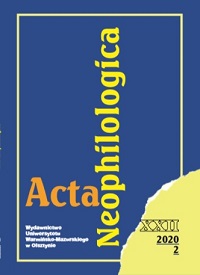Słownik psychologiczno-lingwistyczny "Zmysły, emocje i przymiotniki języka rosyjskiego" – nowe narzędzie w pracy tłumacza
Psychological-linguistic Dictionary Senses, Emotions and Adjectives in Russian – A New Tool in Translator’s Work
Author(s): Joanna OrzechowskaSubject(s): Social Sciences, Language studies, Language and Literature Studies, Psychology, Applied Linguistics, Eastern Slavic Languages, Philology, Translation Studies
Published by: Wydawnictwo Uniwersytetu Warmińsko-Mazurskiego w Olsztynie
Keywords: psychological-linguistic dictionary; adjectives; positive emotions; negative emotions;translation;
Summary/Abstract: This article presents a new type of dictionary – a linguistic-psychological dictionary reflecting structures of language, similar to dictionaries based on associations, but also reconstructing the mental and emotional states of an average user of the Russian language. It was compiled as a result of analyzing 15918 Russian adjectives from the perspective of their relationship with emotions originating in reference to various senses. The dictionary contains information on “the emotional load” of these adjectives, that is how pleasant or how unpleasant emotions a given adjective evokes. The analyzed lexemes were assessed by respondents on the scale of emotions: slightly (un)pleasant – moderately (un)pleasant – very (un)pleasant, which was marked with an appropriate number of pluses or minuses. It cannot be overestimated how useful such a dictionary and the information it contains are. Although it is believed that representatives of different cultures experience universal emotions, their quality and intensity hidden behind particular linguistic units can diverge between different cultural-linguistic communities. Emotions are conditioned socially, culturally, and historically; they play an important role in international communication. Thus when they are incompetently and mistakenly interpreted, this can disturb dialogue between various cultures and even lead to conflicts. In the article, considering equivalents cygarowy/сигарный, differences in the evaluation of these adjectives in Polish and Russian are presented, illustrating the need to look for emotionally adequate translation equivalents when rendering them.
Journal: Acta Neophilologica
- Issue Year: 2/2020
- Issue No: XXII
- Page Range: 199-208
- Page Count: 10
- Language: Polish

